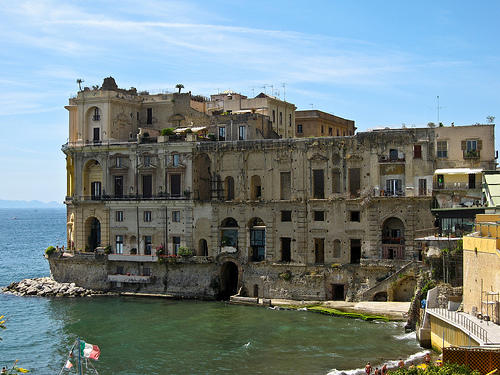Getting to know you - Lesson 2 - Conversation:
Da quanto tempo è in Italia?
(How long have you been in Italy?)
(photo
by Armando Mancini used
under terms of Creative Commons license.)

|
Capitano Gentile: |
Da quanto tempo è in Italia, Tenente? |
|
Tenente Smith: |
Da due mesi, Signor Capitano. |
|
Capitano Gentile: |
E a Napoli? |
|
Tenente Smith: |
Da poco, sono qui da tre settimane. |
|
Capitano Gentile: |
Come trova l'Italia? |
|
Tenente Smith: |
E un bel paese e Napoli è una bellissima città, pero fa molto caldo. |
|
Capitano Gentile: |
Da quale parte degli Stati Uniti viene? |
|
Tenente Smith: |
Dalla California. |
|
Capitano Gentile: |
Anche Sua moglie? |
|
Tenente Smith: |
Si, è di San Francisco. |
Translation:
|
Captain Gentile: |
(For) how long have you been in
|
|
Lieutenant Smith: |
(For) two months (Mr.) Captain. |
|
Captain Gentile: |
And in |
|
Lieutenant Smith: |
(For) only a short time. I have
been here (for) three weeks. |
|
Captain Gentile: |
How do you find |
|
Lieutenant Smith: |
It's a beautiful country and |
|
Captain Gentile: |
From what part of the |
|
Lieutenant Smith: |
From |
|
Captain Gentile: |
Your wife also? |
|
Lieutenant Smith: |
Yes, she is from |
Notes on conversation
1.
Da quanto tempo
è in Italia? Literally, "For how
long are you
in Italy." In Italian the question and the answer are in the present
tense.
2.
E means
"you are," "she is," "he is," "it is."
"You," "she," "he," "it" may be omitted
when the subject is understood.
3.
Gender of
nouns. Every noun in Italian is either masculine or feminine: un paese
(masculine), "a country" ("village"); una città (feminine),
"a city."
4.
Adjectives
agree with the nouns they modify. For example, un bel paese, "a
beautiful
country"; una bella città, "a beautiful city."
5.
Bellissima,
"very beautiful," also agrees with the noun it modifies: un
bellissimo paese, una bellissima città.
6.
Da also means
"from;" di literally means "of." In Italian "you come
from" (viene da) and "you are of" [place of birth] (à di) .